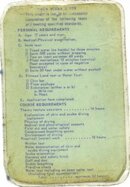captain
Contributor
What gets me is the way things have been set up. When I learned to dive, virtually everything was covered in training that is now divided up into little packages, each with its own card. When I finally went for my first C-card, after eleven years of diving in all kinds of conditions, I was given a Basic SCUBA card from PADI. At that time, that card meant a lot. It meant that I had experience in buddy breathing from depth, emergency ascents, deep dives (to 130 feet, my personal limit because I get narked easy), emergency and rescue procedures, you name it. That card came with no more restrictions to its use than I chose to place upon it myself.
Then, sometime in the '80s, I lost the original card and sent off to PADI for a replacement. To my dismay, my new card was marked "Alternate Air Source Required." Until that time, I was not even aware of the (to me) new practice of hooking another second stage to a regulator for emergency use. By 1992, my Basic C-card had become even more restricted, so I went through the motions to get my OW just to keep down the hassle.
Now, I find that if I want to dive below 60 ft. from a charter boat or other "official" dive operation, I will need an AOW. And this just to do what I was trained to do years before I even got my first C-card.
If the agencies want to compartmentalize their training of new divers, fine. But why penalize us old geezers by changing the "value" of our once meaningful certifications?
I'll get off my soap box now.
I had a similar issue. I still have my paper YMCA card from 1970. All it says is "Scuba Diver". The back of the card list the swim test requirements and standards and number of hours (32).
When I learned the Y was dropping scuba I decided it might be a good idea to get a extra card. The Y no longer had me on record so I had to send them a copy of both sides my card. I discussed the fact that my cards requirements at the time it was issued were pretty much equal to current AOW and asked for an AOW card. They said they would look into it but all I got as an OW card so I still show my original and then we discuss if they will accept it for a dive that requires AOW. If they don't I move on down the road.




 Cheers AndyNZ
Cheers AndyNZ 